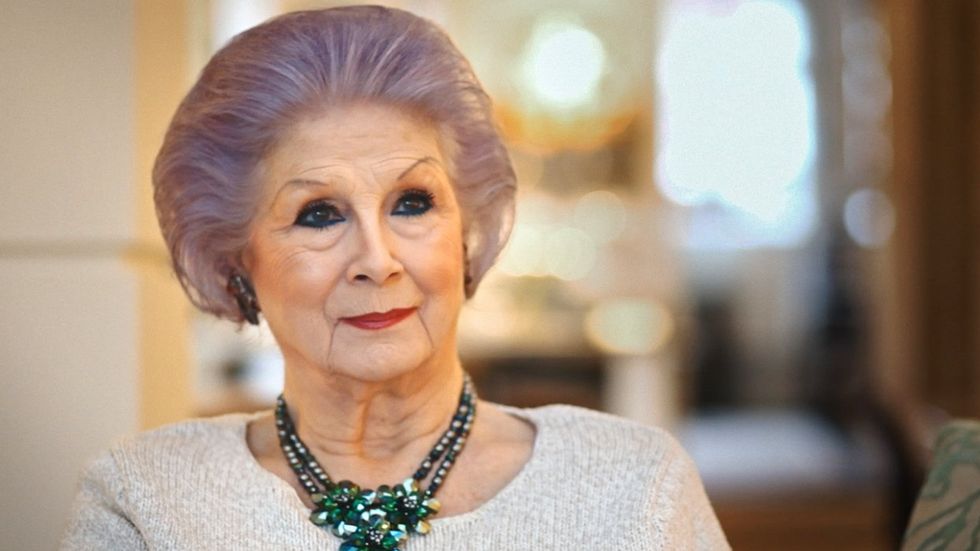
WWW.OUT.COM
Why HBO's 'Enigma' is a must-see doc for trans young people
In 2017, I spent a week in a mental hospital after a prevented suicide attempt. The weight of being a trans woman and the weight of the world combined to leave me feeling exhausted, like I had nowhere to turn and no one to lean on.One of the first events I attended after my release was a premiere party for Shadi Petoski's delightful animated series, Danger & Eggs, where trans women like Trace Lysette, Jazz Jennings, Jen Richards, and Petoski were in attendance. These women were more than happy to welcome me back into the real world.Richards, an actor, writer, and activist I had known for years, hugged me and said she was glad I had survived. "The world needs more of us in it, not fewer," she said.Those words have stuck with me nearly a decade later.Now, in Zackary Drucker's beautiful new documentary Enigma, I hear those words echoing in a time when they're more needed than ever in my life.While much of Enigma is spent examining identity, celebrity, and the public spotlight, it also conveys a powerful message about growing old for trans people. This message is even more vital for young trans people, and that is why I believe the documentary should be mandatory viewing for every trans person under 35.Enigma shows that growing old as a trans person isn't just possible; if you surround yourself with other trans people it can be one of the most beautiful things in the world.Enigma follows two women, April Ashley and Amanda Lear, who met in the 1950s while working at Le Carrousel, the most popular nightclub in Europe and a hub for trans performers. The two women took very different paths to survive at a time when being trans meant you could be thrown in jail.When Ashley was publicly outed in 1961, she became a fierce advocate for the trans community. When rumors began that Lear was trans, she denied them and continues to do so to this day.April and Amanda took very different paths to survival, and both are valid; however, going stealth does come at a cost the loss of community.The harassment and oppression that trans women speak about facing during the 1960s and 70s in Enigma is frighteningly familiar to trans people today. They speak of being arrested for wearing feminine clothing in public, of having their gender and womanhood questioned in the media, of losing their jobs and families, and of being targeted by courts and lawmakers.While Enigma shows two paths to survival, some young people are now taking a third path: the path of detransitioning.According to the National Institute of Health, 82.5 percent of people who reported a history of detransitioning cited external factors in their decision. Additionally, 35 percent cited pressure from a parent, 32 percent cited community or society stigma, 26 percent said they had trouble getting a job, 20 percent said they had pressure from a spouse or partner, and 33 percent said "it was just too hard for me."More and more, whenever I look at social media or sites like Reddit, I see young people expressing their hopelessness around being trans in 2025.Many of them say they were ready to come out or had started their transition, only to be forced back in the closet by the recent election or the recent spike in anti-trans rhetoric and laws around this country and the U.K. They feel like there's no hope and no place in the world for them. They feel like there isn't a path forward for them as trans people.In the past, I believe some of these individuals would have transitioned and gone stealth. Before social media, before the internet, and before trans people were such a visible target, it was easier to get surgery, move, and start a new life. They could've taken the path that women like Amanda took.Now, that doesn't seem like an option. They'd rather not transition at all.What Enigma shows is that if they can find other trans people, they can transition and they can make it through the darkest of days. When discussing the trans performers at Le Carrousel, Bambi, one of the women who worked there, notes that while there was some competition among them, there was also a strong sense of community.Trans women would come from around the world to have a chance to be a part of Le Carrousel. Once they got there, they were taken under the wing of other trans women, they learned about hormones, and they learned about surgery. Most importantly, they weren't alone.Alone, someone like April Ashley might've become lost or hopeless, but because she had her community, she was able to make it through."Transition is very difficult, no matter what decade you do it in. It sets you apart from society, it sets you outside of your family, your friends," writer and historian Morgan M. Page says in the documentary. "But the one thing that you get out of that that is incredible and that gives you strength is your trans siblings, you know, the sisterhood of trans women.""That kind of community is what sustains many of us in our day-to-day lives, and especially the older women from previous generations," she adds.That is a lesson we could all learn from, especially those of us who are younger and feeling hopeless and alone.After she was publicly exposed as being trans, April Ashley's existence became a living hell. She went to interview after interview, explaining herself and being cruelly and crudely questioned about her body. She lost all her modeling jobs and was never hired for one again. She was later sued by her husband and forced to undergo a sex examination by a court that involved a "three finger test" to measure her vagina. Eventually, the court ruled that Ashley was biologically male and therefore her marriage to a man was illegal.For the next 50 years, Ashley continued to fight.From 1970 until 2004, trans people were unable to change their birth certificates in the U.K. and were therefore unable to get married. It was a dark time, and for many, a hopeless time.Some women, like Lear, chose to go stealth, or keep their trans status private, so they could escape the scrutiny and hate that came from living a public trans life. But as Enigma shows, there was a cost to that, the cost of community.Finally, in 2004, England passed its Gender Recognition Act, something Ashley had lobbied for, and she was able to get a new birth certificate with her proper name and gender.In the next several years, Ashley was welcomed back to her hometown of Liverpool as a beloved hero. The Museum of Liverpool hosted an exhibit on her life, which drew over a million visitors. She was awarded an MBE."Now, some people would have perhaps thrown up their hands and walked away, but to April Ashley's credit, she continued to push all the way up until the Gender Recognition Act and beyond for a change in the law," Page says in the film. "She didn't abandon her community, and that's one of the reasons April Ashley is so beloved, especially by British trans people." Ashley spent decades being a scapegoat and a target, but in her later life, she not only survived but also thrived. It's because when things got hard, she had her community with her.One of the most beautiful moments in the doc comes toward the end, when we get to see footage from 2013 of Bambi and Ashley meeting up together, speaking French, drinking champagne, and laughing. It's like a day hadn't passed since they last performed at Le Carrousel half a century earlier."So my lesson to anybody listening is never, ever think life is over. No matter what age you are, you just go on and on and on, and life keeps offering you the most wonderful surprises, and take them," Ashley says in the film.If women like April Ashley and Bambi can survive 60 years of this bullshit, so can we.They found community and family, and as long as we can keep doing that, trans women will never be erased.Enigma is streaming now on Max.If you or someone you know needs mental health resources and support, you can still call, text, or chat with the 988 Suicide & Crisis Lifeline or visit 988lifeline.org for 24/7 access to free and confidential services. Trans Lifeline, designed for transgender or gender-nonconforming people, can be reached at (877) 565-8860. The lifeline also provides resources to help with other crises, such as domestic violence situations. The Trevor Project Lifeline, for LGBTQ+ youth (ages 24 and younger), can be reached at (866) 488-7386. Users can also access chat services at TheTrevorProject.org/Help or text START to 678678.
0 Comments
0 Shares
101 Views
0 Reviews



